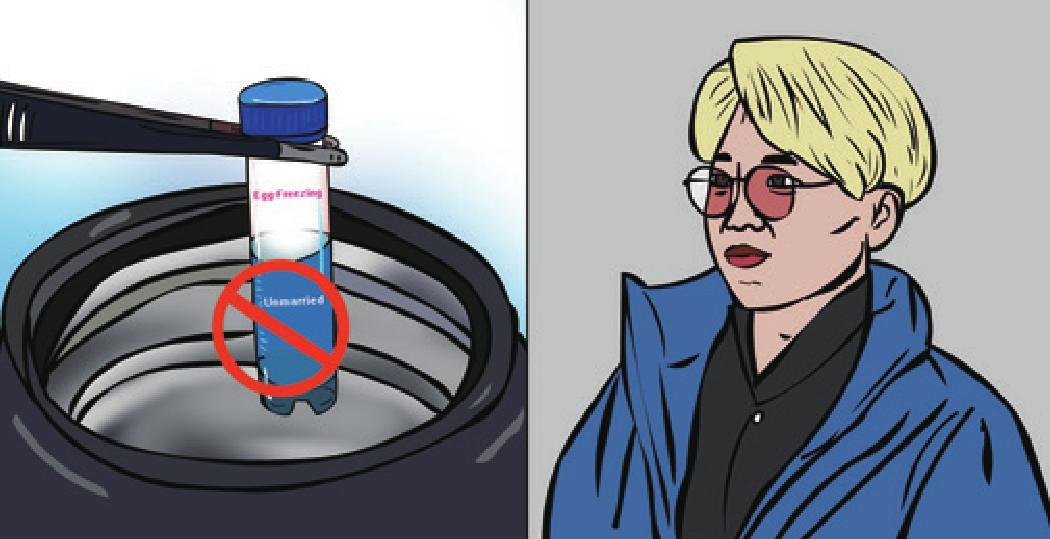Should Single Women Be Allowed To Freeze Their Eggs?
2020-01-09

A 31-year-old unmarried woman, Xu Zaozao, recently sued a Beijing hos- pital after it refused to freeze her ova, commonly known as egg cells, so that she could have children later. Xu said she needed to devote her time and energy to her career, having received a recent promotion. It meant greater responsibilities and pressure to perform well. So she wanted to freeze her eggs while she was at the prime of fertility.
Initially, the hospital ran an examination to fi nd if her eggs were healthy and could be frozen. Though Xu passed the test, her request was refused when the hospital realized she was unmarried.
According to Chinese regulations, single women are not allowed to use assisted reproductive technology, including egg freezing. Even married women can avail of the technology only when at least one partner in the marriage is diagnosed with fertility problems, like having cancer or being infertile because of reproductive problems.
Xus case drew widespread attention and sparked a heated debate. Late marriage and late childbirth are gradually becoming usual among todays Chinese women, especially in metropolises like Beijing and Shanghai. But women, unlike men, lose their fertility around the age of 50. Therefore, some think women freezing their eggs is like buying insurance or medicine to ward off childlessness and regret at a later age. Women should have control of their own life and the restrictions should be removed.
Others think legitimization of indiscriminate egg freezing would lead to social instability and risk, such as illegal transactions in eggs and a surge in single-parent families. Therefore the issue should be dealt with cautiously.
Empower women
Liang Jianzhang (Finance.sina.com): From a legal perspective, the ban on single women freezing their eggs is contrary to the current laws in China. According to the Law on the Protection of Womens Rights and Interests, the Marriage Law and the Population and Family Planning Law, all citizens have the right to bear children. Children born out of wedlock have the same rights as children born to married parents. Single women are Chinese citizens, which means they are entitled to all these rights.
Lets analyze this realistically. Women can take up almost every profession in todays society and even prevail over men in some areas. In the past some had to rely on their husbands support to raise their children. But now, they are capable of doing it independently. Removing this ban does not mean we advocate single mothers, because traditional monogamous families are still the ideal for most people. But we also need to respect the right of some capable women to choose another way of having children.
The best childbearing age for women is before 35. A 35-year-old who has not found her Mr. Right might lose her chance of having a child forever without technological help. The egg freezing technology, together with other related fertility-assisting technologies, could help these women extend their fertility window.
With the advancing of society and improvement of gender equality, women will shoulder the same duties and pressures as men in society. Many of them, especially some successful career women, might choose not to get married or have kids. But at the same time, there is no technology to replace women in childbearing. Humanity needs a sufficient number of offspring for sustainable development, which is why the government should do its utmost to protect womens right to fertility freedom.
Zhang Yaya (China Womens News): According to a regulation on sperm banks released in 2013, single Chinese men can save their sperms for having children in the future.
But single women are not allowed to freeze their eggs. The only way they can do this is by going to other countries, such as to the U.S. and Japan, which costs a lot of energy, money and time. This is genderbased discrimination. Frozen sperms or eggs are essentially a kind of birth insurance, and single women should enjoy the same rights as single men.

In the current legal framework, if a woman wants to give birth, she has to fi nd a man while she is still fertile. This is an inherent advantage for men who can get married for no other reason but their reproductive function.
Women might choose to resort to this technology or they might not. They might succeed in having a child through this technology or they might not. The point is that women should be entitled to the same right as men.
A social issue
Cheng Jingyi (Jiemian.com): Egg freezing requires huge amounts of time, money, energy and emotions and may not have a high success rate. Studies show that to guarantee a 75-percent success rate, a 34-year-old needs to freeze 10 eggs, a 37-year-old 20 eggs, and a 42-year-old 60 eggs. Even with successful fertilization, women with an elder age still need to deal with pregnancy complications such as hypertension and diabetes that can occur during pregnancy.
As a new form of reproductive technology, egg freezing passed the experimental stage in 2013. But the Ethics Committee of the American Society for Reproductive Medicine pointed out in 2018 that this technology may still have some unknown effects on the health of future generations in the long term. Therefore, given the medical complications and long-term risks of the egg freezing technology, women should not rely too much on it.
Su Di (www.people.com.cn): Scientific and technological progress could bring changes not only to peoples quality of life but also to family and human relations ethics. From a technological perspective, the survival rate of frozen eggs is still limited. More importantly, frozen eggs are often used for in-vitro fertilization and test-tube babies are likely to be raised by single-parent families in the end.
As a result, a series of social challenges may evolve. For example, how do single parents shoulder the burden of childcare? In human society, fertilization should be the re- sult of a social relationship. How do children of single-parent families grow up without mental health problems?
While freezing eggs is a personal matter of womens rights, the results of this action become social issues. Thats why the government should deal with this request cautiously.
Dong Zhongyu (Henan Daily): Despite the maturity of this medical technology, egg freezing still has potential ethical risks. With no policy or regulation in place, lifting the ban might lead to egg traffi cking and illegal surrogacy.
Furthermore, if the ban is scrapped, more young people might miss the golden age of childbearing because they will not be in a hurry to have children, which is contrary to the current policy of encouraging childbearing.
